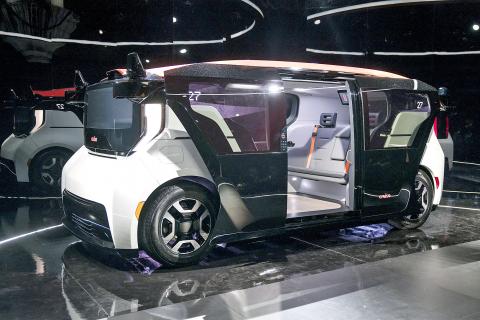A General Motors Co (GM) manufacturing plant that was set to close would instead get a new life producing electric trucks and sports utility vehicles (SUVs), the company announced on Monday
The US auto giant in 2018 announced a massive restructuring, which would have slashed 15 percent of its workforce to save US$6 billion, a move criticized by US President Donald Trump as “nasty” because it would have required shuttering several manufacturing facilities in North America.
The Detroit-Hamtramck assembly plant in Michigan was scheduled to close as part of that plan, but would now get an overhaul and start producing two new electric vehicles (EVs) starting late next year: a pickup truck and the Cruise Origin autonomous shuttle vehicle, the company announced.

Photo: Bloomberg
“Our electric vehicle plan is unmatched in the industry,” GM president Mark Reuss said at a news conference in Detroit. “Hamtramck will be GM’s first dedicated all EV assembly plant.”
GM is investing US$2.2 billion in the plant, along with US$800 million in projects related to the new model, the company said in a statement.
The new configuration will employ more than 2,200 people when it is fully operational at the end of 2022, after the construction of a new paint shop and the addition of modern assembly line equipment, the company said.
The plant, which opened in 1985 and employs about 900 workers, would be idled for several months beginning at the end of next month as the renovations begin, with most workers transferred to other GM plants.
GM’s decision to keep Hamtramck open came after the company announced in 2017 it would launch 20 EV models by 2023 as part of a push for an “all-electric” fleet amid demands from governments worldwide for greater automobile fuel efficiency.
However, the company has also faced political pressure, including from Trump, who has not shied away from publicly berating companies to get them to commit to investing more and creating more US jobs.
The news on the plant would be especially welcome as Trump battles for re-election in November, when he hopes to repeat his upset 2016 election victory in Michigan, which is seen as crucial to him winning a second term.
Michigan politicians and labor unions also pushed against the plant’s closure, with Detroit Mayor Mike Duggan calling GM chief executive Mary Barra to plead the facility’s case.
“I did ask her: ‘Why can’t GM build new vehicles here?’” Barra said, adding that building the factory required more than 4,000 residents to move elsewhere.
Hampered by trade disputes, US manufacturing is in the midst of a recession, with production dropping 1.3 percent in the final months of last year, compared to a year prior, according to the US Federal Reserve.
General Motors reported a decline in US auto sales at the end of the fourth quarter, reflecting the lingering effect of a bruising 40-day strike by the United Auto Workers (UAW) that dented its vehicle inventory.
The labor union cheered the news that the plant would remain open.
“Over 2,200 jobs and a new technology product will deliver job security and a bright economic future for UAW members for decades to come at Hamtramck,” UAW vice president Terry Dittes said in a statement.

To many, Tatu City on the outskirts of Nairobi looks like a success. The first city entirely built by a private company to be operational in east Africa, with about 25,000 people living and working there, it accounts for about two-thirds of all foreign investment in Kenya. Its low-tax status has attracted more than 100 businesses including Heineken, coffee brand Dormans, and the biggest call-center and cold-chain transport firms in the region. However, to some local politicians, Tatu City has looked more like a target for extortion. A parade of governors have demanded land worth millions of dollars in exchange

An Indonesian animated movie is smashing regional box office records and could be set for wider success as it prepares to open beyond the Southeast Asian archipelago’s silver screens. Jumbo — a film based on the adventures of main character, Don, a large orphaned Indonesian boy facing bullying at school — last month became the highest-grossing Southeast Asian animated film, raking in more than US$8 million. Released at the end of March to coincide with the Eid holidays after the Islamic fasting month of Ramadan, the movie has hit 8 million ticket sales, the third-highest in Indonesian cinema history, Film

Taiwan Semiconductor Manufacturing Co’s (TSMC, 台積電) revenue jumped 48 percent last month, underscoring how electronics firms scrambled to acquire essential components before global tariffs took effect. The main chipmaker for Apple Inc and Nvidia Corp reported monthly sales of NT$349.6 billion (US$11.6 billion). That compares with the average analysts’ estimate for a 38 percent rise in second-quarter revenue. US President Donald Trump’s trade war is prompting economists to retool GDP forecasts worldwide, casting doubt over the outlook for everything from iPhone demand to computing and datacenter construction. However, TSMC — a barometer for global tech spending given its central role in the

Alchip Technologies Ltd (世芯), an application-specific integrated circuit (ASIC) designer specializing in server chips, expects revenue to decline this year due to sagging demand for 5-nanometer artificial intelligence (AI) chips from a North America-based major customer, a company executive said yesterday. That would be the first contraction in revenue for Alchip as it has been enjoying strong revenue growth over the past few years, benefiting from cloud-service providers’ moves to reduce dependence on Nvidia Corp’s expensive AI chips by building their own AI accelerator by outsourcing chip design. The 5-nanometer chip was supposed to be a new growth engine as the lifecycle